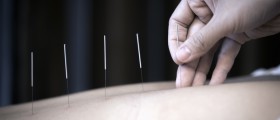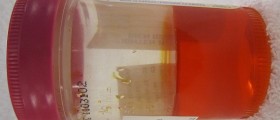I used to be able to sweat but now I am un able to and it happened around the time of my bulimia. When I walk in the heat or exercise I over eat easily and my skin gets bright red. I can sweat some on my back and under my arm pits under my legs but no where else it gets painful and it kinda takes a while for my body to chill.
Because bulimia causes dehydration my only guess is from the constant dehydration from the bulimia that my body has to get used to rehydrating and sweating again.
I know it can't be anhidrosis because I used to sweat so much before my eating disorder....
Anyone have any experiences? any answers? I would appreciate it a lot :-(
Because bulimia causes dehydration my only guess is from the constant dehydration from the bulimia that my body has to get used to rehydrating and sweating again.
I know it can't be anhidrosis because I used to sweat so much before my eating disorder....
Anyone have any experiences? any answers? I would appreciate it a lot :-(
Loading...
I don't have an answer but I would love to know because I literally am experiencing this exact same thing... Used to be the sweatiest... Have been bulimic for over a year... Just noticing how I sweat less is actually harming me sometimes now and I wonder if they are linked
Loading...
Health Hero
1626 posts
Hi.
It is possible that your lack of sweating is related to your history of bulimia. Bulimia can lead to electrolyte imbalances and dehydration, which can affect your body's ability to sweat. Sweating is an important mechanism for regulating body temperature and keeping you cool, and if you are unable to sweat properly, it can lead to overheating and heat exhaustion.
Additionally, the fact that you overheat easily and your skin turns bright red when you walk in the heat or exercise could be a sign of a condition called anhidrosis, which is the inability to sweat properly. Anhidrosis can be caused by a number of factors, including nerve damage, certain medications, and skin conditions. Do you have any history of health conditions?
In summary, your lack of sweating and difficulty regulating your body temperature could be related to your history of bulimia or an underlying medical condition. It is important to seek medical evaluation to determine the cause of your symptoms and receive appropriate treatment.
It is possible that your lack of sweating is related to your history of bulimia. Bulimia can lead to electrolyte imbalances and dehydration, which can affect your body's ability to sweat. Sweating is an important mechanism for regulating body temperature and keeping you cool, and if you are unable to sweat properly, it can lead to overheating and heat exhaustion.
Additionally, the fact that you overheat easily and your skin turns bright red when you walk in the heat or exercise could be a sign of a condition called anhidrosis, which is the inability to sweat properly. Anhidrosis can be caused by a number of factors, including nerve damage, certain medications, and skin conditions. Do you have any history of health conditions?
In summary, your lack of sweating and difficulty regulating your body temperature could be related to your history of bulimia or an underlying medical condition. It is important to seek medical evaluation to determine the cause of your symptoms and receive appropriate treatment.
Loading...
















